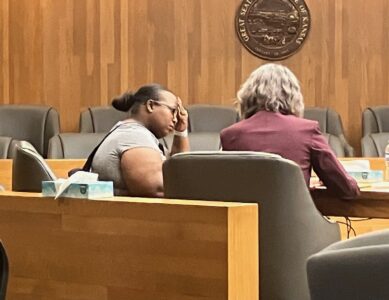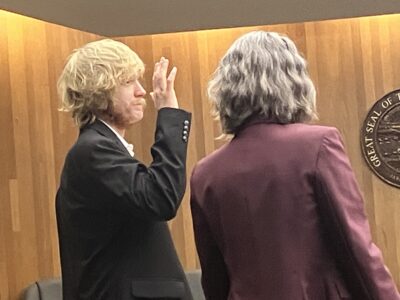Judge orders Scott Bloch to one-month prison sentence; appeal pending
Washington, D.C ? The lawyer once tasked with protecting government whistle-blowers was ordered incarcerated for one month in a much-delayed and contentious sentencing Wednesday that now faces the further delay of an appeal.
Former U.S. Special Counsel Scott Bloch pleaded guilty 11 months ago to a misdemeanor for withholding information from a congressional investigation into his office, to which he was appointed by President George W. Bush. His sentencing was scheduled nine times but repeatedly delayed in a dispute that was uncommon not only for its substance and duration but because it paired the usual courtroom rivals — the prosecutor and defendant — against the judge.
Bloch is a Kansas University graduate who spent more than a decade at the Lawrence firm Stevens & Brand.
Bloch attorney William Sullivan and prosecutor Glenn Leon tried one last time on Wednesday to persuade U.S. Magistrate Judge Deborah Robinson that Bloch should be eligible for probation and sentenced only to probation because Bloch and the Justice Department had reached a plea agreement with that understanding. Sullivan pointed out that others who had pleaded guilty to the charge got probation, including baseball star Miguel Tejada two years ago.
Robinson has maintained that the law requires a minimum of one month behind bars and denied Bloch’s request to withdraw his plea. Sullivan asked if she would let Bloch serve the sentence on home confinement with release to work, but she questioned what gave her the authority to allow that and invited him to file written arguments.
Sullivan also said he would immediately file a motion asking her to keep Bloch from serving the time until the Court of Appeals can weigh in. Robinson said she would consider that request.
Bush appointed Bloch to head the federal agency responsible for protecting the rights of federal workers and ensuring that government whistle-blowers are not subjected to reprisals.
But Bloch was accused of retaliating against his own employees and closing whistle-blower cases without investigating them. While he was under investigation for those allegations, Bloch had his government computer and those of two of his staffers wiped clean of information in December 2006 by a private computer repair company, Geeks on Call.
The House Reform Committee questioned Bloch about the computer scrub in March 2008, and he told them it was to address a problem that caused his computer to crash. Bloch admitted as part of his guilty plea that he withheld information from the congressional staff and that before he ordered the wipe of the computers he understood the procedure would make it virtually impossible to recover deleted files or e-mails.
As the lawyers made their final arguments, Robinson pressed Leon to show her where in the plea agreement it said the government would advocate for probation. As he pointed to various paragraphs explaining the government would not oppose a sentence on the low end of a guideline range of zero to six months, she forced him to acknowledge that it wasn’t explicitly stated.
But both Leon and Sullivan argued that the agreement was implicit. “If zero isn’t probation, I don’t know what is,” Sullivan said. He told Sullivan that his client had been an exemplary father of seven with a lifetime of service that should be considered.
Bloch briefly thanked the judge, said he felt no ill will toward anyone and believed good would come from the case.
Robinson asked lawyers on both sides if two matters should affect his agreement under the plea deal to accept responsibility for his crime — Bloch’s request to withdraw his plea and a lawsuit he’s filed alleging the federal government violated his privacy by revealing the computer scrub to The Wall Street Journal. Both sides argued it shouldn’t have an impact because Bloch has never denied the facts in the case and she accepted their position.







